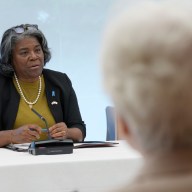A professor from the University of Ottawa hopes to gather perspectives from around the world in terms of risks such as H1N1 and beyond, when she attends an international working group in Lyon, France, next month.
From Dec. 1 to 3, Louise Lemyre — a professor at uOttawa’s School of Psychology and the McLaughlin research chair on the psychosocial aspects of risk and health — is attending a group assembled by the World Health Organization to discuss the communication of health risks, as well as the H1N1 virus.
The objective: To devise a worldwide training and assessment strategy as part of an international policy on health risk communication.
Although H1N1 is one of the risks to be considered, “the strategy will be more generic,” said Lemyre. “It will also cover transmission from animals, risk from food, and other risks,” she said.
While Lemyre will be there as a part of the Canadian representation, there will be representatives from all over the world.
The working groups are interactive, and Lemyre said she’ll bring her experience and “will learn strategies from other countries that can be applied here in Canada.”
A social psychologist in population health, Lemyre’s research area is how ordinary people perceive and understand risk and what drives their motivation for prevention, she said.
“Currently H1N1 is a big concern and every country is trying to deal with the second wave, but we need to adapt the strategy for any other risk … like a natural disaster or other emergent risks,” she said.
“We don’t always have all the information about new risks, because the science and knowledge and data aren’t there yet. People have to learn to work with uncertainty,” she said.
And it’s essential to exchange information, she said, “because different (countries) have experiences at different stages than us. It shows us how to adapt in terms of a different context.
“It opens up their views and their interpretation and also helps Canada to better understand the citizens who come from those countries and have had different experiences,” she said.
Lemyre will incorporate the results of the working group into her work.
















